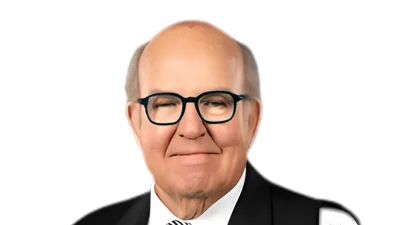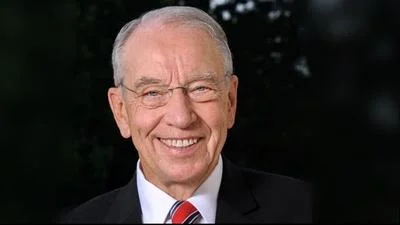The Congressional Record is a unique source of public documentation. It started in 1873, documenting nearly all the major and minor policies being discussed and debated.
“TRIAL OF DONALD JOHN TRUMP, PRESIDENT OF THE UNITED STATES” mentioning Chuck Grassley was published in the Senate section on pages S142-S143 on Jan. 26.
Of the 100 senators in 117th Congress, 24 percent were women, and 76 percent were men, according to the Biographical Directory of the United States Congress.
Senators' salaries are historically higher than the median US income.
The publication is reproduced in full below:
TRIAL OF DONALD JOHN TRUMP, PRESIDENT OF THE UNITED STATES
The PRESIDENT pro tempore. A quorum is present.
Under the previous order, the hour of 2:30 p.m. having arrived and a quorum having been established, the Senate will proceed to consideration of the Article of Impeachment against Donald John Trump, the former President of the United States.
The majority leader.
Mr. SCHUMER. Mr. President, at this time, pursuant to rule IV of the Senate Rules on Impeachment and the U.S. Constitution, the President pro tempore emeritus, the Senator from Iowa, will now administer the oath to the President pro tempore, Patrick J. Leahy.
Mr. GRASSLEY. Please raise your right hand. Your hand is on the Bible.
Do you solemnly swear that in all things appertaining to the trial of the impeachment of Donald John Trump, former President of the United States, now pending, that you will do impartial justice according to the Constitution and the laws, so help you God?
The PRESIDENT pro tempore. I do, so help me God.
At this time I will administer the oath to all Senators in the Chamber in conformance with article I, section 3, clause 6 of the Constitution and the Senate impeachment rules.
Will all Senators now rise and raise their right hands.
Do you solemnly swear that in all things appertaining to the trial of the impeachment of Donald John Trump, former President of the United States, now pending, you will do impartial justice according to the Constitution and laws, so help you God?
SENATORS. I do.
The PRESIDENT pro tempore. The clerk will call the names in groups of four. The Senators will present themselves at the desk to sign the Oath Book.
The legislative clerk called the roll, and the Senators present answered ``I do'' and signed the Official Oath Book.
The PRESIDENT pro tempore. The Acting Sergeant at Arms will make the proclamation.
The Acting Sergeant at Arms, Jennifer Hemingway, made the proclamation as follows:
Hear ye! Hear ye! Hear ye! All persons are commanded to keep silent, on pain of imprisonment, while the House of Representatives is exhibiting to the Senate of the United States the Article of Impeachment against Donald John Trump, former President of the United States.
The PRESIDENT pro tempore. The Senator from Kentucky.
Mr. PAUL. Mr. President, article II, section 4 of the Constitution says: ``The President, Vice President and all civil Officers of the United States, shall be removed from Office on Impeachment for, and Conviction of, Treason, Bribery, or other high Crimes and Misdemeanors.''
Article I, section 3, clause 6 states: ``When the President of the United States is tried, the Chief Justice shall preside.''
As of noon last Wednesday, Donald Trump holds none of the positions listed in the Constitution. He is a private citizen. The Presiding Officer is not the Chief Justice, nor does he claim to be. His presence in the Chief Justice's absence demonstrates that this is not a trial of the President but of a private citizen.
Point of Order
Therefore, I make a point of order that this proceeding, which would try a private citizen and not a President, a Vice President, or civil officer, violates the Constitution and is not in order.
The PRESIDENT pro tempore. Under the precedents of the Senate regarding constitutional points of order, including those of the Senate while sitting as a Court of Impeachment, the Chair submits the question to the Senate: Is the point of order well taken?
The majority leader.
Mr. SCHUMER. Mr. President, the theory that the impeachment of a former official is unconstitutional is flat-out wrong by every frame of analysis: constitutional text, historical practice, precedent, and basic common sense. It has been completely debunked by constitutional scholars from all across the political spectrum.
Now, the junior Senator from Kentucky read one clause from the Constitution about the Senate's impeachment powers. He left out another from article I, section 3: ``Judgment in Cases of Impeachment shall not extend further than to removal from Office, and disqualification to hold and enjoy any Office of honor, Trust or Profit under the United States.
If the Framers intended impeachment to merely be a vehicle to remove sitting officials from their office, they would not have included that additional provision: disqualification from future office. The Constitution also gives the Senate the ``sole power'' to try all impeachments.
So what did past Senates decide on this question? In 1876, President Grant's Secretary of War, William Belknap, literally raced to the White House to tender his resignation before the House was set to vote on his impeachment. Not only did the House move forward with the impeachment, but the Senate convened a trial and voted as a Chamber that Mr. Belknap could be tried ``for acts done as Secretary of War, notwithstanding his resignation of said office.''
The language is crystal clear, without any ambiguity. The history and precedent is clear. The Senate has the power to try former officials, and the reasons for that are basic common sense. It makes no sense whatsoever that a President or any official could commit a heinous crime against our country and then defeat Congress's impeachment powers and avoid disqualification by simply resigning or by waiting to commit that offense until their last few weeks in office.
The theory that the Senate can't try former officials would amount to a constitutional get-out-of-jail-free card for any President who commits an impeachable offense.
Ironically, the Senator from Kentucky's motion would do an injury to the Constitution by rendering the disqualification clause effectively moot. So, again, by constitutional text, precedent, and common basic sense, it is clearly and certainly constitutional to hold a trial for a former official. Former President Trump committed, in the view of many, including myself, the gravest offense ever committed by a President of the United States.
The Senate will conduct a trial of the former President, and Senators will render judgment on his conduct.
Motion to Table
Therefore, the point of order is ill-founded and, in any case, premature. If Senators want this issue debated, it can and will be argued during the trial. Therefore, I move to table the point of order, and I ask for the yeas and nays.
The PRESIDENT pro tempore. Is there a sufficient second?
There appears to be a sufficient second.
The clerk will call the roll.
The legislative clerk called the roll.
The result was announced--yeas 55, nays 45, as follows:
YEAS--55
BaldwinBennetBlumenthalBookerBrownCantwellCardinCarperCaseyCollinsCoonsCortez MastoDuckworthDurbinFeinsteinGillibrandHassanHeinrichHickenlooperHironoKaineKellyKingKlobucharLeahyLujanManchinMarkeyMenendezMerkleyMurkowskiMurphyMurrayOssoffPadillaPetersReedRomneyRosenSandersSasseSchatzSchumerShaheenSinemaSmithStabenowTesterToomey Van HollenWarnerWarnockWarrenWhitehouseWyden
NAYS--45
BarrassoBlackburnBluntBoozmanBraunBurrCapitoCassidyCornynCottonCramerCrapoCruzDainesErnstFischerGrahamGrassleyHagertyHawleyHoevenHyde-SmithInhofeJohnsonKennedyLankfordLeeLummisMarshallMcConnellMoranPaulPortmanRischRoundsRubioScott (FL)Scott (SC)ShelbySullivanThuneTillisTubervilleWickerYoung
The PRESIDENT pro tempore. On this vote, the yeas are 55, the nays are 45.
The motion to table is agreed to; the point of order is not sustained.
The majority leader.
Providing For Related Procedures Concerning The Article Of Impeachment
Against Donald John Trump, President Of The United States
Mr. SCHUMER. Mr. President, I have a resolution to organize the pretrial proceedings at the desk.
The PRESIDENT pro tempore. The clerk will report the resolution by title.
The legislative clerk read as follows:
A resolution (S. Res. 16) to provide for related procedures concerning the article of impeachment against Donald John Trump, President of the United States.
Mr. SCHUMER. I ask for the yeas and nays.
The PRESIDENT pro tempore. Is there a sufficient second?
There appears to be a sufficient second.
The clerk will call the roll.
The legislative clerk called the roll
The result was announced--yeas 83, nays 17, as follows:
YEAS--83
BaldwinBarrassoBennetBlumenthalBluntBookerBoozmanBraunBrownBurrCantwellCapitoCardinCarperCaseyCassidyCollinsCoonsCornynCortez MastoCramerCrapoDuckworthDurbinErnstFeinsteinFischerGillibrandGrahamGrassleyHassanHeinrichHickenlooperHironoHoevenInhofeKaineKellyKennedyKingKlobucharLankfordLeahyLujanLummisManchinMarkeyMcConnellMenendezMerkleyMoranMurkowskiMurphyMurrayOssoffPadillaPetersPortmanReedRomneyRosenRoundsSandersSasseSchatzSchumerShaheenSinemaSmithStabenowSullivanTesterThuneTillisToomeyVan HollenWarnerWarnockWarrenWhitehouseWickerWydenYoung
NAYS--17
BlackburnCottonCruzDainesHagertyHawleyHyde-SmithJohnsonLeeMarshallPaulRischRubioScott (FL)Scott (SC)ShelbyTuberville
The PRESIDENT pro tempore. On this vote, the yeas are 83, the nays are 17.
The resolution (S. Res. 16) was agreed to.
(The resolution is printed in today's Record under ``Submitted Resolutions.'')
The PRESIDENT pro tempore. The majority leader.
____________________




 Alerts Sign-up
Alerts Sign-up